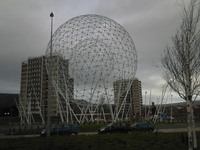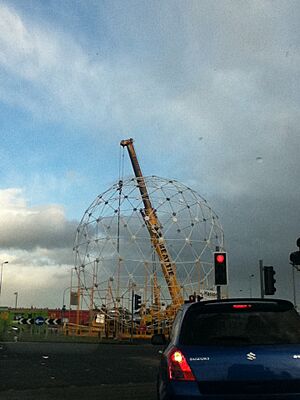RISE (sculpture) facts for kids
Quick facts for kids RISE |
|
|---|---|
 |
|
| Artist |
|
| Year | 2011 |
| Type | Steel |
| Dimensions | 37.5 m × 30 m (123 ft × 98 ft) |
| Location | Belfast, Northern Ireland |
RISE is a very large public art sculpture. You can find it at Broadway Roundabout in Belfast, Northern Ireland. It is one of the biggest artworks in the city.
The RISE sculpture was designed by Wolfgang Buttress. It has two main parts. There is a smaller, ball-shaped structure inside a much larger one. The outer ball is about 30 meters (98 feet) wide. The whole sculpture stands 37.5 meters (123 feet) tall.
The word "geodesic" means the shortest path between two points on a curved surface. For RISE, this means the parts of each sphere are connected with straight bars. This makes the distance between points as short as possible.
Belfast City Council asked for RISE to be built. It was finished in 2011. This was part of a big road improvement project. The sculpture sits above the A12 Westlink Underpass. About 80,000 cars drive past it every day.
Contents
What Does RISE Mean?
The RISE sculpture is made of white and silver steel. It looks like a new sun rising. This design celebrates a fresh start for Belfast. The inner ball stands for the sun coming up over the bogs. The outer ball is like the sun's bright halo. The angled steel supports look like the reeds found in bog meadows. These meadows used to cover more of the area.
Belfast has a history of disagreements. The Westlink road separates some communities. The artist wanted to design a sculpture that everyone could appreciate. He made sure it looked good from every angle. This way, it could be seen as a symbol for all people.
The sculptor asked for ideas from local people. They held creative workshops with groups from nearby areas. People liked this sculpture best. It showed a positive future for Belfast. They also liked its round shape. It has no front or back, so it looks the same from all sides.
How RISE Was Built
Belfast City Council led the plans for RISE. They had strong support and money from several groups. These included the Department for Social Development, the National Lottery, and the Arts Council of Northern Ireland. The Department for Regional Development Roads Service also helped.
Building the sculpture was a big challenge. The steel parts were made by M Hasson and Sons Ltd. GRAHAM Construction was the main company in charge. They supervised putting the sculpture together on site.
Work on RISE was supposed to start in August 2009. It was meant to finish in October 2009. But there were delays. The new completion date was March 2011. It was finally finished in September 2011. This was almost two years later than planned.
The Structure of RISE
The artwork has two main parts. These are two ball-shaped structures. They are held up by thin supports. The engineers, Price & Myers, used ideas from Buckminster Fuller. He was an inventor from the 1950s.
The outer ball is made of 1920 metal tubes. These tubes are bolted together. The inner ball is held in place using a special method called "tensigrity." This is another idea from Buckminster Fuller. It uses tension and compression to create a strong, light structure.
Choosing the Artist
Wolfgang Buttress was chosen after a tough competition. More than 40 artists took part. They came from the United Kingdom, the Republic of Ireland, and other countries.
There was an earlier competition for the sculpture. A different artist, Ed Carpenter, had won with his design called Trillian. However, those plans were stopped. The cost of steel went up a lot. The sculpture's price was set at £400,000. But it was going to cost £600,000. So, they decided to start over.
Cost and Funding
The original idea for the sculpture was estimated to cost £400,000. The final cost was reported to be around £486,000.
Here is where the money came from:
- £330,000 from the Department for Social Development
- £100,000 from the Arts Council of Northern Ireland
- £56,000 from Belfast City Council itself
Community Workshops
In October 2009, school children and older people from Belfast took part in workshops. They worked with the New Belfast Community Arts Initiative. Local writers and the artist, Wolfgang Buttress, were also there. They looked at the plans for RISE. They learned about creative expression.
The workshops helped people understand how the sculpture was made. They also thought about what it means for Belfast. People shared their own creative ideas in response to the project.
 | Frances Mary Albrier |
 | Whitney Young |
 | Muhammad Ali |


